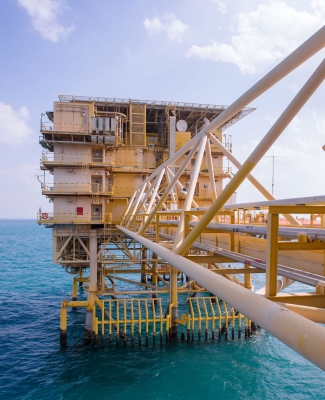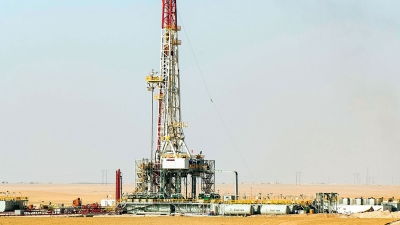
The Kingdom of Saudi Arabia is a member of the Organization of the Petroleum Exporting Countries (OPEC) as a founding member of OPEC, the Kingdom possesses two unique attributes that grant it strategic importance as a global supplier of crude oil. Firstly, it maintains the will and ability to sustain excess production capacity. Secondly, it demonstrates determination and capability to adapt its production to meet changing market conditions. No other country in the world can fulfill these two roles as the Kingdom does.
Kingdom's role in establishing OPEC
Drawing upon its leading and historical role within the global energy market, the Kingdom has been exerting significant and continuous efforts through OPEC since its founding to address the challenges facing the organization. OPEC was established at the Baghdad Conference held on September 10-14, 1960, with the Kingdom being one of its five founding members, alongside Kuwait, Iraq, Venezuela, and Iran.
The Kingdom has always been proactive in establishing institutions and agencies capable of developing and regulating the global energy sector. The Baghdad Conference, in which the Kingdom participated, came after the first Arab Petroleum Congress that took place in Cairo in 1959 under the Arab League, during which Iran and Venezuela participated as observers, and Abdullah al-Tariki represented the Kingdom. At that time, he was the director general of oil and minerals affairs within the Ministry of Finance, before the establishment of the Ministry of Petroleum and Mineral Resources in 1961.
OPEC expanded with the accession of additional members over time, including Qatar (1961), which suspended its membership in January 2019; Indonesia (1962), which suspended its membership in January 2009 but reinstated it in January 2016, only to suspend it again in November 2016; Libya (1962); the United Arab Emirates (1967); Algeria (1969); Nigeria (1971); Ecuador (1973), which suspended its membership in December 1992, reactivated it in October 2007, and subsequently decided to withdraw its membership as of January 1, 2020; Angola (2007); Gabon (1975), which terminated its membership in January 1995 but rejoined in July 2016; Equatorial Guinea (2017); and Congo (2018). Initially, OPEC had its headquarters in Geneva, Switzerland, for the first five years. It was then relocated to Vienna, Austria, on September 1, 1965.
The Kingdom's key role within OPEC
The Kingdom holds 19 percent of the world's petroleum reserves, contributes 12 percent to global production, and accounts for over 20 percent of petroleum sales in the global market. Its proven petroleum reserves are estimated at around 267 billion barrels.
As the largest producer in OPEC, the Kingdom is committed to leading the international organization and fulfilling its responsibilities. This includes working towards market stability and demand growth, and achieving OPEC's goals of coordinating and unifying petroleum policies among member countries. The aim is to secure fair and stable prices for petroleum producers, ensure an efficient and consistent supply of petroleum to consuming nations, and provide a fair return on investment to those investing in the crude oil sector.
Throughout OPEC's existence, the Kingdom has consistently prioritized equitable pricing and production stability. Its moderate approach has always focused on international cooperation, peace, economic development, and prosperity for the world. The Kingdom's petroleum policy aims to stabilize petroleum markets by balancing supply and demand. It leverages its substantial reserves, high production capacity, and surplus energy to meet global demand during different seasons and in the face of any supply disruptions to the international petroleum market.
Rather than acting unilaterally, the Kingdom has consistently worked collaboratively, taking into account the interests of both producers and consumers. Therefore, it seeks cooperation with other oil-producing countries, both within and outside of OPEC, to ensure a sufficient supply of crude oil in the international market, while also preventing supply surpluses that could lead to price collapses. The Kingdom aims to maintain market stability and shield it from sharp fluctuations, whether in terms of prices or demand levels. It also strives to maintain reasonable price levels that serve the interests of both producing and consuming countries. This contributes to the growth of the global economy, particularly the economies of developing countries while achieving appropriate returns for the global petroleum industry to stimulate further exploration and production to meet the growing oil demand.
The Kingdom's contributions to the global oil market balance
The Kingdom is committed to contributing to achieving balance in the global oil market, recognizing stability as the cornerstone of its petroleum policies. It works towards establishing close cooperation with oil-producing and oil-consuming countries. The Kingdom is connected through close bilateral oil cooperation with most countries in the world through official visits, trade exchanges, investments, information and opinion exchanges, and policy coordination. Additionally, the Kingdom is an active member of several international organizations and gatherings focusing on petroleum and energy issues.
The Kingdom has consistently keened on OPEC's vital role in restoring balance to the market, as it is undeniable that OPEC countries cannot control prices. OPEC's role is limited to working towards achieving a balance between supply and demand in the crude oil market. Meanwhile, prices are influenced by several factors, such as market conditions for petroleum products like gasoline and heating oil in major markets like the United States, Japan, and the European Union, as well as political developments in certain producing countries, speculation activity, investment funds and their inclination towards investing or not investing in crude oil, winter weather conditions, key currency exchange rates - especially the US dollar - and other factors. The retention of surplus production capacity is among the key roles of the Kingdom and other OPEC countries in their quest for achieving stability in the oil markets. Despite its high cost, this surplus capacity is necessary to avoid major crises resulting from supply shortages.
The Kingdom has demonstrated its active presence in market stability and balance on numerous occasions, making the Kingdom's position within OPEC one of the strongest. Without the approval of the Kingdom, the organization would not hold its most powerful stance. This aligns with the Kingdom's close relationships with consuming countries. In addition to bilateral cooperation at various levels with most major petroleum-consuming countries, such as the United States, Japan, the European Union, Korea, China, the Philippines, South Africa, and India, the Kingdom plays a significant and influential role within the International Energy Forum. This forum includes over seventy major producing and consuming countries, as well as different petroleum organizations. It aims to enhance cooperation, coordination, and dialogue among producing and consuming nations and the energy industry.
The Kingdom's efforts in resolving energy issues
Through this mediating role between producers and consumers, the Kingdom has succeeded in resolving many issues and addressing numerous challenges in the relations between both parties. In the 1980s, there was no contact between the two sides with a prevailing lack of trust. However, the Kingdom was able to bridge different perspectives and establish a common ground for cooperation and dialogue between producing and consuming countries through a clear institutional mechanism with defined tasks and roles. This had a positive impact on the global economy, economies of developing countries, and the economy of the Kingdom itself, as it possesses the world's largest petroleum reserves and is concerned with market stability and supplies in the short and long term.
The principle of cooperation led by the Kingdom enhances OPEC's role in energy markets and within the organization itself, making OPEC appear stronger when its members need to work together to prevent internal collapse. The events of 1998-1999, when a sudden drop in oil prices to below USD10 per barrel caused economic devastation upon OPEC member states, exacerbated political divisions, and exerted strong pressure on local governance systems.
The Kingdom contributes to price control and has played a pivotal role over the years in attempting to stabilize oil prices. In 2004, it backed prices at around USD35 per barrel. However, when prices exceeded USD50 per barrel, the Kingdom faced the challenge of price control. The Kingdom can fulfill this role due to its significant global influence and presence, as it retains around two million barrels per day of unused capacity, which means it has higher and further-reaching capabilities than the daily production requirements. This capacity can replace any loss of production in world markets.
OPEC's third summit in Riyadh
OPEC's third summit, held in Riyadh on November 17-18, 2007, along with the second summit in Caracas in 2000, established stable energy markets and sustainable development, and it adopted a comprehensive long-term strategy in 2005. During the Riyadh Summit, the Solemn Declaration III was issued, reaffirming the commitment to providing petroleum supplies adequately to global markets, working with everyone towards stable and balanced global markets, promoting global peace, and strengthening investment in the energy sector. The declaration also emphasized the mutual relationship between security, demand security, and supply equilibrium for market stability, bridging communication and expanding dialogue between energy producers and consumers, coordinating production policies and prices with other petroleum-exporting countries, enhancing the role of petroleum in future global energy demand, linking energy imports with economic development, achieving harmony and concordance in environmental issues, and working to reduce the suffering and poverty facing developing countries.
OPEC fund
The Kingdom continued to play its vital role in OPEC by establishing a financing ecosystem to support human development worldwide. It was a founding member of the OPEC Fund for International Development, a multilateral development financing organization established in 1976. The fund has provided assistance to around 119 countries since that time.
The fund dedicates its efforts to improving the well-being of communities by providing financing to the public and private sectors, and trade, in addition to offering grants to support social and economic progress worldwide. OPEC's efforts, led by the Kingdom, enhance infrastructure and human capabilities across various sectors, e.g., energy, transportation, agriculture, water, sanitation, health, and education in around 135 countries. By focusing on people and partnerships, it maximizes the impact of development in an increasingly complex and challenging development landscape.
The Kingdom's role in OPEC
The Kingdom currently continues its efforts to balance petroleum markets through the OPEC agreement, which was signed in November 2016. In addition to OPEC member countries, the agreement includes ten non-OPEC participating countries with the aim of reducing petroleum production to improve prices. The agreement was followed by the Declaration of Cooperation signed in December 2016 and the Cooperation Charter signed in July 2019.
This agreement aims to support market stability and balance supply and demand for market participants and the petroleum industry. Since May 2020, the average compliance rate of the countries participating in the OPEC agreement with production quotas reached 130 percent, supported by voluntary contributions from some participating countries.
Related quizzes

